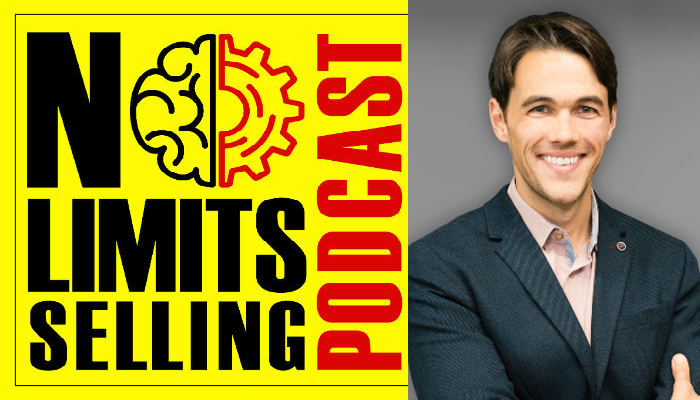Matthew Pollard The Real Deal
On Episode 105 of The No Limits Selling Podcast, we have Matthew Pollard, founder and CEO of Rapid Growth, LLC. Matthew Pollard is responsible for five multi-million-dollar business success stories, all before the age of 30. His humble beginnings, the adversities he faced, and his epic rise to success show that anyone, with the right motivation and the right strategies, can achieve anything they set their mind to.
Today, Forbes calls him “the real deal,” Global Gurus lists him as a Top 30 Sales Professional, Top Sales World Magazine named him a Top 50 Speaker, and BigSpeak lists him as an international Top 10 Sales Trainer. He’s also the bestselling author of The Introvert’s Edge, which hit the Amazon charts as the 8th Most-Sold Book of the Week, appears on HubSpot’s list of the “Most Highly-Rated Sales Books of All Time,” and was selected by BookAuthority as the #2 “Best Introvert Book of All Time.” His soon-to-be-released second book, The Introvert’s Edge to Networking, has already received endorsements from Harvard, Princeton, Neil Patel, Michael Gerber, Dr. Ivan Misner, and Marshall Goldsmith.
P.S. While I have you, have you heard about my new book, The Introvert's Edge to Networking? If you pre-order the hardcover, please email me your receipt, and I'll send you the pre-order bonuses as soon as they're ready. Also, every order drives Amazon to get my work in front of more people, so I'd be honored if you picked up a copy. Thanks in advance for your support!

Contact Matthew:
[EDITOR’S NOTE: This podcast is sponsored by No Limits Selling. It is a fun, fast-paced podcast that delivers hard-fought business advice that you can implement today to improve your sales and performance]
Interested In Our Real Estate Coaching Services? Explore Our Website: Link
Feeling Not Well Today? You Can Use Our Mindset Boosters App To amp Up Your Mood: Link
Find us on Social Media:
LinkedIn | Facebook community | Instagram
Like what do you listen to? Subscribe to our podcast!
Ready to become fearless? We can help you become fearless in 60 days so you accomplish more in your career Schedule A 15 min Call with Umar
Summary
Introduction: The Power of Introverts
The podcast begins with an introduction to Matthew Pollard, a successful entrepreneur, speaker, and author. He shares his journey as an introvert in the business world, emphasizing that introversion is not a barrier to success. He also introduces his book, "The Introvert's Edge," which provides strategies for introverts to excel in sales and networking.
Overcoming Challenges: From Introvert to Sales Expert
Matthew recounts his early days in sales, where he faced numerous challenges due to his introverted nature. He was initially unsuccessful, but he didn't give up. Instead, he dedicated himself to learning everything he could about sales and marketing. Through hard work and determination, he was able to transform himself into a sales expert, proving that introverts can indeed thrive in sales.
The Systemization of Selling: A Game Changer
Matthew shares his insights on the importance of systemization in sales. He believes that having a step-by-step process can significantly improve sales performance. This approach allows individuals to focus on each part of the sales process, making it less overwhelming and more manageable. Matthew also highlights that this method is particularly beneficial for introverts, as it provides a clear roadmap to follow.
The Introvert's Edge: Unleashing the Power of Introverts
In this section, Matthew discusses his book, "The Introvert's Edge." He explains that the book aims to help introverts realize their potential in sales and networking. It provides practical strategies and techniques that introverts can use to their advantage. Matthew emphasizes that introverts have unique strengths, such as listening and empathy, which can be powerful tools in sales and networking.
Conclusion
In this insightful podcast, Matthew Pollard, a successful entrepreneur and author, dismantles the misconception that introverts cannot excel in sales and networking. Drawing from his personal journey, he illustrates how introverts can overcome challenges and leverage their unique strengths, such as empathy and listening skills, to succeed in these fields. He emphasizes the importance of systemization in sales, advocating for a step-by-step approach that makes the process more manageable. Through his book, "The Introvert's Edge," he provides practical strategies for introverts to thrive in sales and networking. Ultimately, Pollard's message is one of empowerment: introversion is not a barrier but a unique strength that, when harnessed correctly, can lead to remarkable success.
Questions & Answers
Who is Matthew Pollard, and what is his expertise?
What is the main premise of Matthew Pollard's book, "The Introvert's Edge"?
How does Matthew Pollard suggest introverts can succeed in sales?
Can introverts excel in networking according to Matthew Pollard?
What is Matthew Pollard's message to introverts who aspire to succeed in sales and networking?
Don’t miss this opportunity to transform your real estate career with one-on-one coaching. As an experienced real estate coach, I, Umar Hameed, am dedicated to helping you unlock your full potential and achieve your real estate goals. To learn more about who am I and my clients ↓
If you’re ready to take the next step, book an appointment with me today and begin your journey toward success in the real estate industry.
